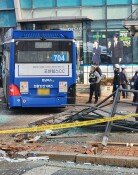[Editorial] Time for Education Ministry to Review Two Taboos of College Entrance Process
[Editorial] Time for Education Ministry to Review Two Taboos of College Entrance Process
Posted October. 13, 2004 23:21,
Following the request of universities to use individual college entrance examinations as a main tool for student selection, the Korean Federation of Teachers Associations (KFTA) announced yesterday that it also supports the introduction of college examinations and autonomous university rights in the college entrance process. There are three taboos that the Education Ministry prohibits in the college entrance process: high-school grading systems, individual college entrance exams, and entrance by contribution. Among those, all the taboos, except for entrance by contribution conditions came up for debate.
The college examination had been forced out of the process in the past for the reason that it was seen as biased towards private education. However, we need to prove whether the principle of a ban on individual college entrance examinations is still acceptable in light of the recent status of education. There must be some reasons why universities support individual college exams, and the nations biggest teachers group, KFTA, also voices the same demand. Universities have asserted that they should select at least one-third of their total students through individual college entrance exams, since high school records are unreliable.
It is also necessary to check if private education expenses have decreased since the prohibition on individual college entrance exams. Private education costs last year reached up to 13 trillion won, but will be equal to the governments education budget if figures not included in the statistics are added. That explains why private education costs, despite the fact that college exams have been banned, may have sharply increased. Due to the rush to study abroad, brain drain and flowing out of foreign money have been expanded to the education exodus. The logic which individual college entrance exam should be banned for the reason of private education now seems to be invalid.
The era when the Education Ministry held full power over the college entrance system and universities is over. If the college entrance system strays away from reality, it will be disregarded. The Education Ministry is firmly committed to reflecting high school records in the entrance process. However, universities have applied them to less than 10 percent of their entrance decisions, even though they said they would apply it to 50-60 percent. The reason why is that school records are not distinctive.
It is not the correct attitude to believe that only the Education Ministry and the Korean Teachers Unions stances are reasonable. Seoul National Universitys suggestion to apply both the college entrance exam and regional quotas to the selection process could be an alternative. The Education Ministry should be wise enough to find a realistic plan.



![“설거지해도 그대로”…냄비 ‘무지개 얼룩’ 5분 해결법 [알쓸톡]](https://dimg.donga.com/c/138/175/90/1/wps/NEWS/IMAGE/2026/01/15/133164664.3.png)

![[속보]尹 ‘체포방해’ 1심 징역 5년 선고](https://dimg.donga.com/c/138/175/90/1/wps/NEWS/IMAGE/2026/01/16/133171597.1.jpg)

